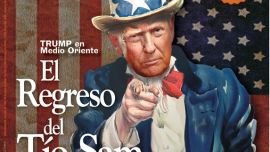There are two things that the biopic The Two Popes, released by Netflix this summer, state about Pope Francis’ supposed relationship with Argentina. One is that he is full of clichés about his national condition, from forcing Pope Benedict XVI to love football or dancing tango to telling a trite joke about Argentines and their relationship with their own ego. The second is that the fictional Jorge Bergoglio feels remorseful about his management of the Jesuit order he led during the 1976-1983 military dictatorship.
Both things are fairly documented in real life. Speech wise, the Pope has profited from coming from “the end of the Earth,” as he presented himself in his opening salute after he was elected in March 2013. And he has indirectly spoken about his ambiguous and complex position during the dictatorship and how he clashed with two of his priests, who were later abducted and tortured.
But the past does not fully explain a present nuance: why Francis has not yet come to Argentina, almost seven years into his papacy. Since he ascended to the helm of the Catholic Church, Pope Francis has visited 49 countries, 10 of them in the Americas and six in South America. But unlike his two non-Italian predecessors, John Paul II and Benedict, who rushed to go back home in the first year of their papacy, Francis has not set foot on Argentina. Why hasn’t he? And will he?
Alberto Fernández, just over a month into his presidency, is plac i n g relations with the Vatican high on his foreign policy agenda. He’s got at least two reasons to do so. Firstly, the Pope wields considerable influence over many local leaders, most notably on social movements who represent the unemployed and are connected with grassroots Catholic priests who play an important role in containing poverty. But secondly, the president also wants to take advantage of the pontiff’s global reputation for his economic project’s own benefit – mostly notably the thorny renegotiation of the country’s debt with private creditors and the International Monetary Fund (IMF).
The Casa Rosada confirmed this week that Fernández will call on the pontiff at the Vatican on January 31, as part of his first trip abroad as president. Six days later, the Vatican will host an event on “New Forms of Social Fraternity and Inclusion” that will be attended by two key collaborators in Fernández’s circle: Strategic Affairs Secretary Gustavo Beliz and Economy Minister Martín Guzmán. And, notably, the event’s line-up also includes the managing director of the IMF, Kirstalina Georgieva, right at a time when the administration needs to open talks with the creditors.
Call it a coincidence but, as Einstein would say, God does not play dice. In May 2019, Guzmán’s mentor, Nobel Laureate Joseph Stiglitz, met in the Vatican with the Pope and, through the pontifical foundation Scholas Occurrentes, they agreed to work together in order to “work on the education of alternative systems that do not worship money.” Their memorandum of understanding warned about “the problems of certain forms of market economies that encourage individualistic behaviour and in which markets do not end up serving the people but rather the people end up serving the markets.” Guzmán was there too.
As with most things in his still-incipient administration, Fernández is aiming for a difficult centre-ground with his fellow countryman at the Vatican. While he shares the Pope’s international economics agenda regarding a staunch criticism of the financial sector, he is not so enthusiastic about Francis’ emphasis on the environmental – as a recent conflict over mining in the western province of Mendoza shows. Also, the Fernández government is on a collision course with the Church over legal abortion, which the president has promised to push in Congress this year. As an indication of the difficult prospects of the relationship, this week the Vatican rejected the government’s proposed nomination for ambassador to the Holy See, Luis Bellando, a career diplomat who happened to be divorced and remarried.
If everything goes well, Fernández’s tightrope act may convince the pope to fly back home before the president’s term
ends in 2023. Every time he is asked why he has not returned
to Buenos Aires since he left to unexpectedly become the leader
of over a billion Catholics worldwide, Francis says his schedule is too tight – and that he does not control it. Of course, nobody believes he could not arrange it. The Pope might not play
dice either, but he excels at political poker. related news





















Comments